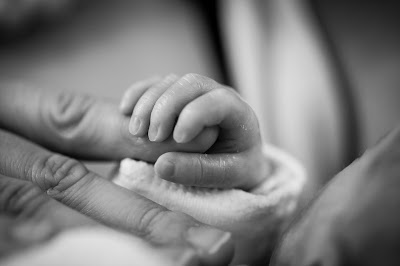The importance of being a parent when children won’t live long after birth
This research article deals with neonatal palliative care guidelines which increasingly encourage parents to (1) provide care to their dying babies, and (2) spend time with their babies before and after death. The purpose of this specific article was to explore and better understand how parental actions of providing care and spending time with their dying babies impacted the memory-making process of the grieving parents.
Although globally millions of babies die within the first month after birth, most parents grieving such a loss face a unique challenge because their grief is rarely recognized by society, meaning it is rarely publicly acknowledged, mourned or socially supported. This “disenfranchised grief” makes it more difficult for parents to find appropriate ways to create meaning during the emotional turmoil inherent in losing an infant.
The acts of spending time with the baby before and after death, as well as caring for the baby in a paternal manner—such as bathing, dressing, and holding the child—transform the intangible nature of such a loss into a tangible engagement between parent and child. This article focuses specifically on creating a substantive theory of memory-making in neonatal end-of-life care. In doing so it relies on a study from 2015 grounded in the theory of “affirmed parenthood.” The core of affirmed parenthood relies on three psychosocial procedures: (1) creating evidence, (2) being guided, and (3) being a parent. When a parent losing a baby engages in these three processes, the parent is able to create strong memories and images associated with the child, rely upon those who can help the parent to engage with the baby despite fear, and accept the role of parent, even in the brief period of the baby’s life.
Researchers used a qualitative method and interviewed couples who had faced the trauma of losing a baby during the neonatal time period. Parents spoke candidly of the importance of having time spent with their child. One parent noted the “precious” nature of the time spent with his child. Even though he only had an hour and a half with his baby, this time provided him the ability to say goodbye to his child. A mother who lost her twin children described the time spent with them as humanizing, allowing her to see her babies as “real people” rather than “just something that happened.” Indeed, this time made her children “a real part of our lives, and not just this bad thing that happened in the hospital one time.”
No parents interviewed expressed regret spending time with their baby just prior to, or even after, death. In fact, having the opportunity to touch and hold the baby was a memory parents cherished. One mother described the profound emotional impact of having the opportunity to nurse her child prior to his untimely death, “[h]olding him was huge. Huge.” A grieving father recalled the importance of cuddling his baby: “We had many cuddles. Up on our chests, in our arms. We cuddled heaps…Physical touch was very important.” The simple act of holding the baby gives parents the ability to engage with their child in a unique manner. One mother described studying every detail of her children, a memory she still clings to, “I can still close my eyes and see their faces eight years later.”
Although holding, touching, and otherwise engaging with the child were important aspects of taking on the role of parent and seeing the child as a unique individual, caring for the child in tangible ways, such as bathing, also proved to be an important and cathartic experience for parents. One parent described the act in a simple, yet profound manner, “I’m really, really glad we got to bathe him.” For parents who were unable to bathe their child, this can be a source of further grief and regret. One parent describes longing for the chance to bathe his baby, even after the baby’s untimely death. One mother recalls similar longings, reiterating that the chance to bathe her child was something she desired.
Clothing is also a way in which parents can meaningfully engage with their child. One parent recalled her desire to utilize the baby clothing made by her mother. Another recalled going through a pack of clothing at the hospital with the assistance of her nurse and piecing together an outfit for her child based on what she wanted her child to be adorned in. Unfortunately, some parents found a lack of control over the clothing of their child as a source of regret. One parent described feeling as though her desire to cloth her child in preferred clothing rather than the clothing on hand at the hospital was “superficial,” yet important “I really wanted him in the clothes that I had,” she said.
Parents engaged with their children in various ways to form bonds with their infants. Parents sang, read, and spoke to their children as a way of engaging with them and building a bond where the parent could see their child as a unique individual while also solidifying their role as the child’s parent in a tangible manner. In this way the parents were able to overcome the feelings of helplessness by doing something for and with their child, even if the action was as simple as singing a nighttime song. Parents were able to transform their experiences and become the parents to their vulnerable babies, despite the short time they had.
If you appreciate our work and would like to help, one of the most effective ways to do so is to become a monthly donor. You can also give a one time donation here or volunteer with us here.



Leave a Reply
Want to join the discussion?Feel free to contribute!